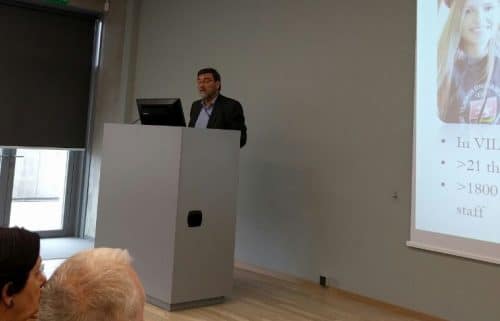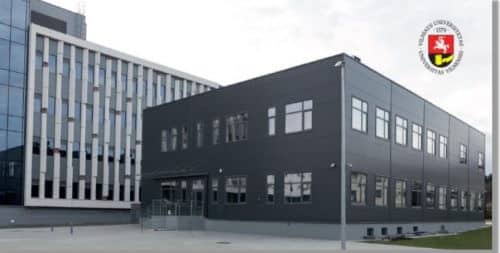Official visit to the Integrated Center for Life Sciences at the University of Vilnius - a new building that opened only six months ago, Life Sciences Center and was also funded by the state and technology commercialization funds

A modern building, modern equipment, sophisticated laboratories for researchers and even mini-laboratories for students, modern classrooms, sophisticated flooring systems for studying in small groups and an adjacent technological greenhouse. This is not some university with wealthy donors on the east coast or in California. This is what was established in recent years and began operating in March of this year on the Vilnius University campus in Lithuania.
The director of the center, Juozas Lazutka, hosted the members of the Israeli delegation to the LIFE SCIENCES BALTICS conference at the facility, which brings together previously separate faculties: biotechnology, biochemistry and natural sciences. According to the director of the center, Prof. Jozef Luzotka, who hosted the delegation, the idea was to allow researchers from different disciplines to collaborate with each other and therefore the Lithuanian government decided to merge two research institutes that operated in the field and the relevant faculties from the University of Lithuania into one entity, managed by the university but with an open infrastructure Also for researchers from the university and industry all over Lithuania and even from the world.
The institute was established with an investment of 42 million euros, from the budget of the Lithuanian government and the European Union. By the way, it turns out that the students in Lithuania receive a full subsidy in most cases. Therefore, the main source of income is from the provision of services, first - a biotechnology incubator where companies can rent offices, and also get access to the researchers' laboratories, as well as from other services, including DNA sequencing services and sample analysis in an automated analysis system or protein production using yeast or bacteria, some of which are commissioned by foreign companies To.
LSC is actually a division of Vilnius University. According to Prof. Lazotka, it was created from the merger of two government institutes (the Institute of Biotechnology and the Institute of Biochemistry) and six departments in the Faculty of Life Sciences. The center started operating in March 2016 and its goal is to be among the 10 strongest and leading research and teaching institutions in Europe in its field. To this end, the center intends to launch at least five international master's programs in modern life sciences (molecular biology, biotechnology, genetics) that will attract students from all EU countries.
Another goal is that at least a third of the doctoral students will be non-Lithuanians, but most importantly - to produce 2-3 new biotechnology companies each year.

The total area of the building - 24 thousand square meters, of which 1,300 square meters are dedicated to a greenhouse known as a bioincubator where companies can rent space and laboratories and work together with the researchers in their laboratories.
Currently, the center houses 200 researchers, of which over 160 are doctoral students. The center will be able to accommodate 800 undergraduate and graduate students in the various programs.
The equipment in the laboratories is also modern and contains, among other things, X-ray crystallography systems, a mass spectrometer and liquid chromatography systems for protein analysis and more.
Next generation flooring systems, and we also have in the computing center, a computing capability specially designed for bioinformatics. Protein structure prediction using bioinformatics methods and models of possible evolution.
According to Lezotka, so far the institutes and departments that make up the center have provided about 30 patents and patent applications in the USA, Great Britain and Europe, including those of the developer of CRISPER-CAS9 Prof. Virginios Shikshinis. Many studies were published in the leading journals such as Science Nature and PNAS and some of them even starred in the covers.
According to Prof. Latsutka, life sciences is a growing field in Lithuania, and it is the center of many companies that developed from it, some of which were sold to international companies such as Teva and Thermofisher, but these still continue to operate the R&D and production centers in Lithuania, and are even growing.
